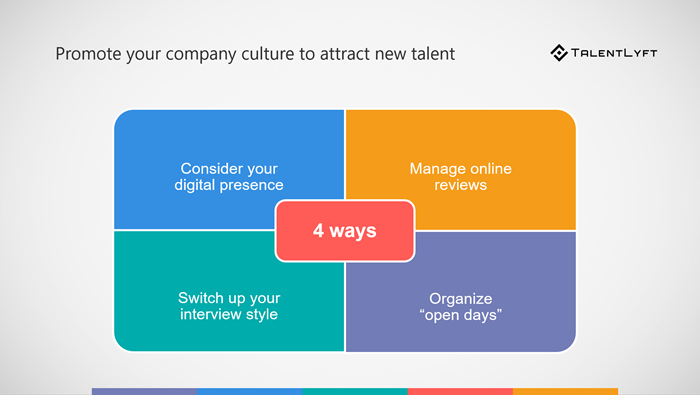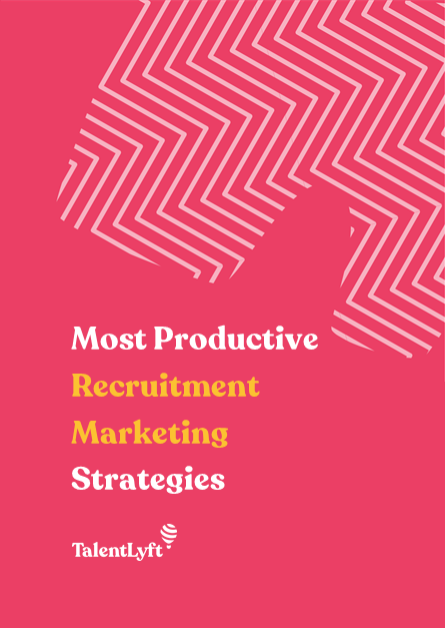![https://adoptostaging.blob.core.windows.net/article/4INJ3ekgC0SbhIesn-acxw.png?9213]()
The importance of workplace culture
Promoting your company culture is one of the most productive recruitment strategies to attract the best talent.
Whether you’re a lifeguard or a lawyer, it’s difficult to feel happy and motivated in a job if the culture of that workplace doesn’t fit with your personal values.
If you value good relationships with those you work with, and there’s no real bond between workers, then you’re going to feel disconnected and out of sorts.
If you value the respect and support of your superior, and they constantly micromanage you, you’re going to get extremely frustrated very quickly.
➡️ Download free guide: The Ultimate Guide for Finding Qualified Candidates in 2019!
Company culture: An important tool for attracting talent
According to LinkedIn’s research, candidates care so much about their potential employer’s company culture that they want to know details about it in a recruiter's first message.
Additionally, company culture is among the top reasons for changing jobs. 25% of candidates said that better company culture is among their top reasons for changing jobs.

Creating, cultivating and promoting a welcoming and positive culture in your organization is one of the key ways that you’ll be able to attract - and keep hold of - the best and brightest in your industry.
Skilled employees have the right and the privilege of demanding more from their workplace, so make your organization talent-worthy. If you deliver security and a feeling of wellbeing to them, they’ll reward you with their best work.
How to promote your company culture to attract new talent?
Here are 4 ways you can promote a great company culture to attract new talent:

#1 Consider your digital presence
People are as diligent now about scoping out businesses they might work for online as they are about researching purchases. If they find you on a recruitment site or are approached by yourselves or a recruiter to apply for a position, chances are they’ll dig into your website and social media channels to get a good sense of who you are before they commit to an interview or initial conversation.
While your website is primarily either a shop or a shop window, you should also consider carefully how the culture of your business is reflected in your career site. Think about including a page about your vision and values as a business - here you can talk about how nurturing talent and creating a good work environment is important to you.
Think about sharing the achievements and activities of your team - give prospective recruits a window into your organization and the day-to-day. Sharing insights into your monthly office bake-off, charity events, marriages, births, retirements and similar are great blogging ideas for your company’s career blog. It’s crucial to give your business a personality, make it seem warm, welcoming and friendly, and people will want to work with you!
#2 Manage online reviews
There’s also an element to your business’ presence online which is a little more outside of your control. Websites like Glassdoor are places where past and present employees can review your business and its culture. There’s really nowhere to hide if your culture isn’t up to scratch, and disgruntled ex-employees are sharing their stories.
This is why it is important to know strategies you can implement to enhance your employer brand using company review sites.
While the best way to control this is to actually cultivate a great culture in the first place, there are things you can do online to elevate your business and make it seem like the great place to work we’re sure it is!
Discouraging negative feedback on things like Glassdoor is dishonest and unadvisable, but encouraging positive feedback is fine. If an employee offers a positive comment or feedback about your organization, encourage them to use a tool like a Glassdoor to share their thoughts.
To try and arrest “control” of the more negative views of ex-employees, consider putting an exit interview structure in place. Encourage the leaver to be honest, and see if they’re OK with you getting in touch in the future to come back to them about what actions the business has taken in response to the feedback they provided. You might find that they leave less disgruntled and less likely to take to the internet to air their opinions!
#3 Switch up your interview style
Interviews are nobody’s favorite thing. They’re awkward, stuffy, and formal. They are, however, a necessary evil in order to get a good sense of the candidate and their ability to professional, articulate, think under pressure, and let’s be honest, be on time and presentable!
Make sure you know the difference between a structured, semi-structured and unstructured job interview and choose the type that best fits your company culture.
If you’re in a very corporate setting than by all means stick to the traditional interview style - you don’t want to give the candidate any false impression about the kind of organization this is.
But if you’re going for something more relaxed - then relax your interview style! Consider moving the interview out of a meeting room - perhaps into a nice relaxed seating area or even a coffee shop. Make it seem like more of catch-up over coffee than a formal grilling.
Structuring the interview in this way will instantly give the candidate an insight into the culture of your organization - you’re professional, but you’re relaxed about how things get done, and you want to make your staff feel as comfortable as possible.
They still need to be on time, presentable and professional, but you’re removing the pretense, the pressure and the formal structure in order to get to the bottom of who they really are, and how well they’ll fit with your business.
#4 Organize “open days”
If the candidate is successful in the first round of interviews, it’s common for organizations to bring them in for a secondary stage - this can involve them demonstrating some of their skills, or meeting more of the team or some other necessary checks.
Whatever this stage is, you should aim to bring them in for a less formal “open day” as part of this stage or as a tertiary stage - where they get to meet the team, walk around the business, eat your food, see your offices, and get a true sense of the culture of your organization. The pressure is off them, and on you now to sell your business as somewhere they’d like - no, love - to work.
Let them visualize themselves working there - just as you try and imagine yourself living there when you’re viewing a house! If you want to cheat a little bit on this one - why not invite the candidate in on a Friday? Your team will naturally be more relaxed, there’ll probably be some fun stuff going on, and it’ll show your culture and its best.
Get the candidate involved in any office activities - the Friday lunch club, table tennis - whatever you’ve got going on, to give them a good sense of the team dynamic. Pick a good selection of team members to welcome them - friendly, interesting and easy to talk to. Never forget that you need to sell yourself to the candidate to at this point - they’re likely to be fielding other job offers!
About the author
Alex Wortley is Marketing Communications Manager at e-days.


















